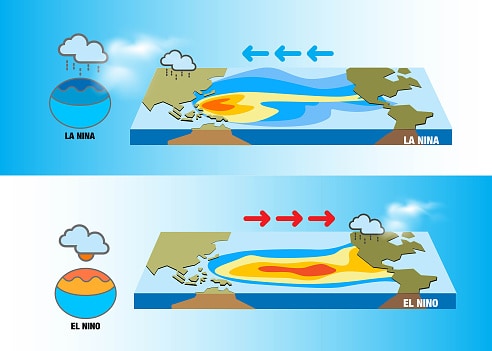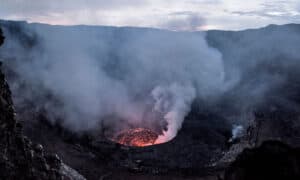The waters off the coast of Washington State are generally thought of as cold and uninviting. Recently, however, some strange fish spotted in the area have scientists puzzled. The fish themselves aren’t so unusual as their appearance in these waters. Usually, they inhabit much warmer places. Many attribute these never-before-seen occurrences to El Niño conditions across the United States. Let’s check out some tropical fish and other fish recently documented in Washington State below!
Wait, What is El Niño?
El Niño is the term given to an abnormal climate pattern during the Northern Hemisphere’s summer. This change occurs due to a shift in normal wind direction. El Niño refers to the conditions created by these wind changes. El Niño causes hotter-than-normal temperatures. On the other hand, La Niña refers to changes that cause colder-than-normal temperatures. The National Oceanic and Atmospheric Administration (NOAA) discusses these abnormal climate pattern conditions with more in-depth explanations in an article on their website. Scientists suspect the increase in tropical fish spotted in Washington state is likely caused by El Niño.

El Niño and La Niña are abnormal climate patterns that affect ocean temperatures.
©Papapapong/iStock via Getty Images
What Tropical Fish Live in Washington State?

Washington State is known for its natural beauty, but certainly not its tropical fish.
©iStock.com/jarenwicklund
Normally, none. A quick internet search for tropical fish in Washington State yields only results for fish stores and aquariums. The average water temperature off the coast of Washington State is 54.4 °F. Most tropical fish prefer waters between 75-80 °F. El Niño raises the average water temperature by about 3-5 °F. Now, that’s still not in the range for tropical fish, so what gives?
Well, the change in water temperature causes the food these fish eat to migrate. In turn, the fish follow their food source rather than risk starvation. According to NOAA, these migrations, which are normally rare, are not uncommon during El Niño.
Tropical Fish Found in Washington State in 2023
Several recordings of unusual fish have been made this year in Washington State. According to the Washington Department of Fish and Wildlife (WDFW) director’s bulletin, mass fish deaths have also occurred this year. This is another direct result of El Niño driving food/prey away from their normal habitats. Let’s check out a few of the crazy fish that have been reported in Washington State in 2023!
Mola Mola
Spotted in Seattle’s Puget Sound, this giant tropical fish amazed the man who saw it. Jonah Zimmerman recorded a video of the massive fish near the surface of the water from his fishing boat and submitted the footage to NOAA.
The mola mola normally lives in warm waters and is found in nearly every ocean around the world. Also called the ocean sunfish, their claim to fame is their sunning behavior. That’s when the large fish comes close to the surface and basks in the sunlight. They regularly grow up to 11 feet in length and weigh more than 2,200 pounds. The largest ever mola mola recorded weighed a whopping 5,070 pounds!
Mahi-mahi
The mahi-mahi, or dolphin fish, is usually found in the Atlantic Ocean, Gulf of Mexico, and Caribbean Sea. They are commonly sold to feed patrons in Australia, Japan, and Hawaii. Never has one been seen so far north in the Pacific Ocean. So, when a fisherman chartering a boat with Far Corners Express Sport Fishing in Westport caught a nearly 22-pound specimen, everyone aboard was absolutely shocked!
The largest ever recorded mahi-mahi weighed 87 pounds. Compared to their normal 10-30 pounds, the fish caught in Costa Rica in 1976 still tops the charts!
Bluefin Tuna
While bluefin tuna are not tropical fish, the sighting of one 200-pound specimen on the shores of Orcas Island astonished researchers along with everyone else who heard about it. The SeaDoc Society reported this amazing first-ever documentation of a bluefin tuna in the Salish Sea. These giant fish actually prefer much colder waters than those around Washington State.
The largest bluefin tuna ever caught weighed nearly 1,500 pounds!
Lancetfish
Just to the south of Washington State in Oregon, beachgoers have reported many lancetfish that have washed up on the shores. These fish generally spend most of their time in deep water but migrate as far north as Alaska. No one has any idea why these fish have started washing up on beaches. Some expect El Niño conditions may be the culprit, but no one knows for sure. Those who have seen them in person marvel at the scary-looking “monster fish.”
These fang-toothed fish grow up to seven feet long and weigh up to 20 pounds. They normally inhabit water about 6,500 feet below sea level. That’s about 1.2 miles below the water’s surface. The most highly skilled human divers can only reach about 1,000 feet down!
Final Thoughts on Tropical Fish in Washington
Although not all the strange fish we mentioned are tropical, it appears that El Niño conditions brought them all to Washington State. While it cannot be said for certain, many people suspect this is true. Many people enjoy the warmer water, but some concerns about global warming causing El Niño conditions have been raised. WDFW is working to help save fish that are dying due to the changes in water temperatures. The amazing tropical fish recently found in Washington State are exciting discoveries. However, some fear that these changes will result in larger, more permanent ones that could have long-term, negative effects. NOAA continues to monitor ocean temperatures and all that they affect.
If you’d like to be a part of the efforts to save our world’s oceans, check out Oceana! This international organization is dedicated to doing just that.
The photo featured at the top of this post is © GeorgeColePhoto/Shutterstock.com
Thank you for reading! Have some feedback for us? Contact the AZ Animals editorial team.







